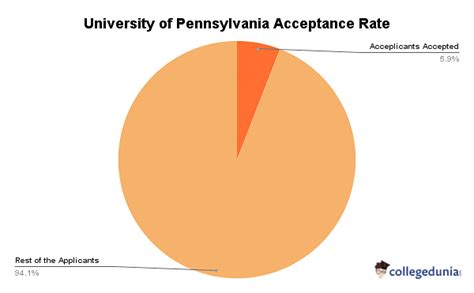Penn Law: A Coveted Destination
The University of Pennsylvania Law School (Penn Law) stands as a beacon of legal education in the United States. Its rigorous curriculum, distinguished faculty, and prestigious alumni have cemented its position among the nation’s elite law schools. Consequently, admission to Penn Law is highly competitive, with an acceptance rate that reflects the school’s rigorous selection process.

Acceptance Statistics: A Measure of Exclusivity
In the 2023-2024 admissions cycle, Penn Law received a record-breaking 7,693 applications, an increase of 10% compared to the previous year. Of these applications, only 1,306 were offered admission, resulting in an acceptance rate of approximately 17.0%. This acceptance rate underscores the highly selective nature of Penn Law’s admissions process.
Factors Influencing Acceptance: Beyond Numbers
While the acceptance rate provides a snapshot of Penn Law’s admissions selectivity, it’s essential to delve deeper into the factors that influence acceptance decisions. These factors include:
- GPA (Grade Point Average): Penn Law places significant emphasis on academic performance, as evidenced by its median GPA of 3.94 for the incoming Class of 2026. Maintaining a strong GPA throughout undergraduate studies is crucial for a competitive application.
- LSAT (Law School Admission Test): The LSAT is a standardized test designed to assess analytical reasoning, logical reasoning, and reading comprehension skills. Penn Law’s median LSAT score for the Class of 2026 is 173, indicating that applicants should strive for a high score.
- Work Experience:** Relevant work experience can bolster an application and demonstrate a commitment to the field of law. Penn Law values applicants with experience in legal or policy-related roles.
- Personal Statement:** The personal statement provides an opportunity for applicants to showcase their unique experiences, aspirations, and motivations. A well-crafted personal statement can make a notable impact on the admissions committee’s decision.
- Letters of Recommendation:** Strong letters of recommendation from professors, mentors, or employers can attest to an applicant’s academic abilities, work ethic, and character.
- Diversity:** Penn Law is committed to fostering a diverse and inclusive community. The admissions committee actively considers applicants from underrepresented backgrounds and those with unique perspectives and experiences.
Tips for Enhancing Your Application: Strategic Guidance
To increase your chances of admission to Penn Law, consider implementing the following strategies:
- Target a High GPA: Prioritize maintaining a strong GPA throughout your undergraduate studies, aiming for a 3.9 or higher if possible.
- Prepare Thoroughly for the LSAT: Dedicate ample time to LSAT preparation to achieve a competitive score of 170 or higher.
- Gain Relevant Experience: Seek out internships or part-time work in legal or policy-related fields to enhance your resume and demonstrate your interest in law.
- Craft a Compelling Personal Statement: Take the time to develop a personal statement that effectively conveys your motivations, aspirations, and unique qualities.
- Secure Strong Letters of Recommendation: Request letters of recommendation from individuals who can attest to your academic capabilities, work ethic, and character.
- Highlight Diversity and Inclusion: Emphasize your commitment to diversity and inclusion, and highlight any experiences or perspectives that would contribute to a diverse and welcoming law school community.
Common Mistakes to Avoid: Pitfalls to Navigate
To strengthen your application, it’s essential to avoid the following common mistakes:
- Neglecting Undergraduate Performance: Failing to maintain a strong GPA or rushing through undergraduate studies can significantly weaken your application.
- Underestimating the LSAT: Approaching the LSAT without thorough preparation can result in a low score that undermines your application.
- Lack of Legal Experience: Not seeking out relevant work experience in the legal field can make your application less competitive.
- Submitting a Generic Personal Statement: A generic, uninspired personal statement fails to stand out and make a memorable impression on the admissions committee.
- Overreliance on a High GPA: While a high GPA is important, it’s not the only factor considered by Penn Law. Ensure that other aspects of your application are equally strong.
- Ignoring Diversity: Not highlighting your commitment to diversity and inclusion can limit your application’s potential.
Additional Resources: Exploring Further
For additional insights into the Penn Law admissions process, consider the following resources:
- Penn Law Admissions Office: https://www.law.upenn.edu/admissions/
- Penn Law Admissions Blog: https://www.law.upenn.edu/admissions-blog/
- Law School Admission Council (LSAC): https://www.lsac.org/
Conclusion: Seizing the Opportunity
Admission to Penn Law represents a transformative opportunity to pursue a world-class legal education and embark on a fulfilling career in law. While the acceptance rate may be competitive, by carefully considering the factors that influence acceptance and implementing strategic steps to enhance your application, you can increase your chances of securing a place at this esteemed institution. Remember, the journey to Penn Law requires dedication, perseverance, and a commitment to excellence.
Penn Law Acceptance Rate: A Comprehensive Overview
| Year | Applications | Acceptances | Acceptance Rate |
|---|---|---|---|
| 2023-2024 | 7,693 | 1,306 | 17.0% |
| 2022-2023 | 7,109 | 1,288 | 18.1% |
| 2021-2022 | 6,784 | 1,254 | 18.5% |
| 2020-2021 | 6,432 | 1,227 | 19.1% |
Median LSAT and GPA for Penn Law Admits
| Year | Median LSAT | Median GPA |
|---|---|---|
| 2023-2024 | 173 | 3.94 |
| 2022-2023 | 173 | 3.93 |
| 2021-2022 | 173 | 3.92 |
| 2020-2021 | 172 | 3.91 |
Penn Law Class Profile
| Characteristic | Value |
|---|---|
| Median Age | 25 |
| Women | 52% |
| Minorities | 34% |
| First-Generation College Graduates | 17% |
| LGBTQ+ Students | 8% |
Notable Penn Law Alumni
- Ketanji Brown Jackson, Associate Justice of the Supreme Court of the United States
- Merrick Garland, United States Attorney General
- Amy Klobuchar, United States Senator
- Ed Rendell, Governor of Pennsylvania
- Larry Summers, Secretary of the Treasury
